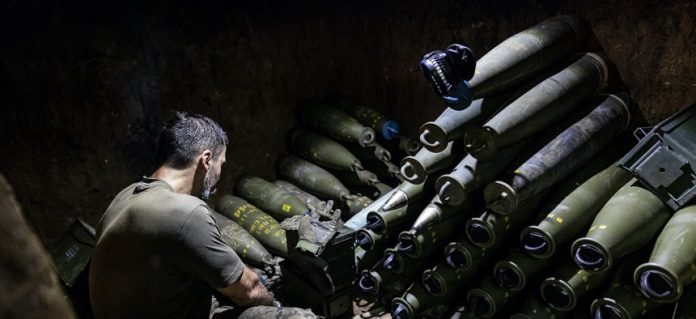Sky News released an analysis stating that Russia is producing artillery shells three times faster and about a quarter cheaper than Ukraine’s Western allies.
The consulting company Bain & Company has provided figures and highlighted a serious problem the Ukrainian armed forces face in fighting the Russian army. The main problem is that Ukraine relies on ammunition supplies from the United States and Europe, whose production lags far behind that of Russia.
The high use of artillery shells has prompted the US, UK and other European allies to try to increase production in their factories. The ability of Ukraine’s main allies to produce artillery shells still lags behind Russian, even given their combined economic power, which far exceeds Russia’s.
Ukrainian soldiers on the front lines say that for every shell they fire at Russian positions, the opposite forces can fire about five shells at them. Ukrainian soldiers say they have learnt to try to make every shot count. Senior Lieutenant Kostiantin, an artillery battery commander with the 57th Brigade, said as follows: “Often, with just one, two or three shells, we can completely destroy a target.”
But the commander stressed Ukrainian troops still need more supplies.
The study found that Russian factories expected to produce or repair about 4.5 million artillery shells this year, compared to a combined production of about 1.3 million shells in European countries and the United States.
The big difference also lies in price. For example, the average cost of producing a 155mm shell – the type produced by NATO countries – is about $4,000 (£3,160) per unit. Whereas the cost of Russian production is about $1,000 (£790) per 152mm projectile used by the Russian armed forces.
Artillery is just one of the many ammunition shortages Ukraine faces. Sky News reported the team visited a group of recruits in the east of the country learning how to use the N-LAW anti-tank missile, first provided to the Ukrainian military by the UK. The shortage of supplies means they are just pretending to fire the weapon in training, and will only use it for real in combat – and only when supplies are available.
“We have a lack of N-LAWs and we need more,” said a soldier with the callsign “Bolt”, who was giving the training to the new soldiers in a reconnaissance battalion of 5th Brigade, adding that soldiers “would be very grateful if they could provide more NATO munitions.”
British factories and the build-up of production lines
Many experts say factory production lines, rather than the front line, could be the winning point in the war in Ukraine.
At the Belfast factory where the N-LAW missile is assembled by global defence company Thales, working hours on the production line at the time were just four days a week from 7:00 am to 4:00 pm, although this was thought to be increasing.
Philip McBride, managing director of Thales Belfast, said N-LAW’s production capacity had doubled since the start of the year and there was scope to double again. Thales produces its own weapons, including the Starstreak, a short-range surface-to-air missile capable of destroying aircraft, and the Lightweight Multi-Mission Missile (LMM).
He explained why the expansion of production began after the conflict between Russia and Ukraine began. Firstly, the UK Ministry of Defence is supplying Ukraine with N-LAWs, not directly to Thales. The missiles initially given to the Ukrainian military were ones that the British armed forces already had in their own stockpile.
They’ve granted that and then they go through their own procurement process, agree what their actual requirement is in the UK… and once they’ve decided that, then they’ll place orders allowing us to ramp up, Mr McBride said.
In addition, finding parts for the N-LAW can take up to two years, which is another key issue. But he also gave an answer to a question about whether production at the plant would have been ramped up earlier if the Ministry of Defence had ordered earlier:
The earlier an order comes, the sooner we can ramp up production.
Staff numbers have also increased, with the site and a second facility in Belfast now employing around 900 people, up from just 500 a few years ago.
